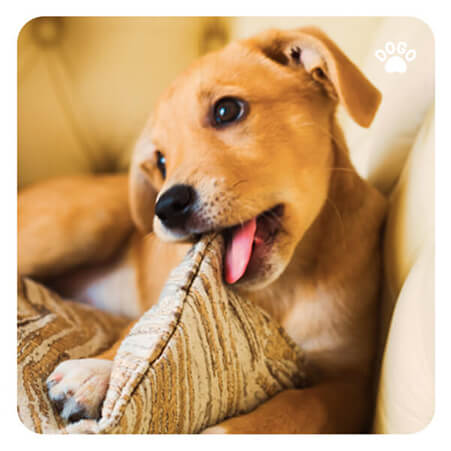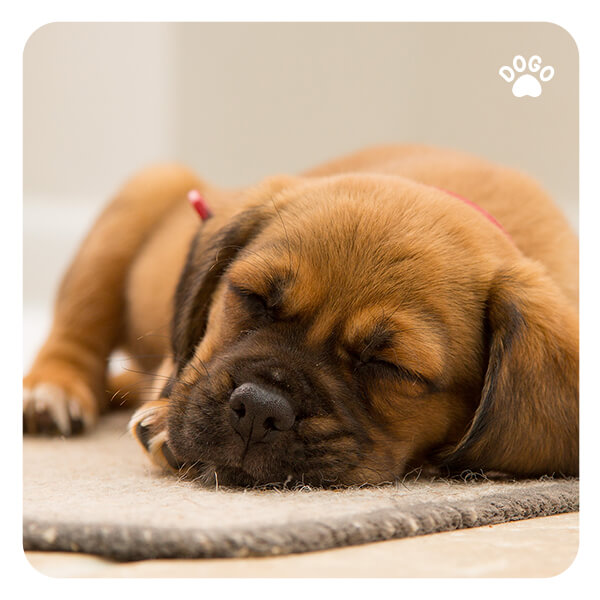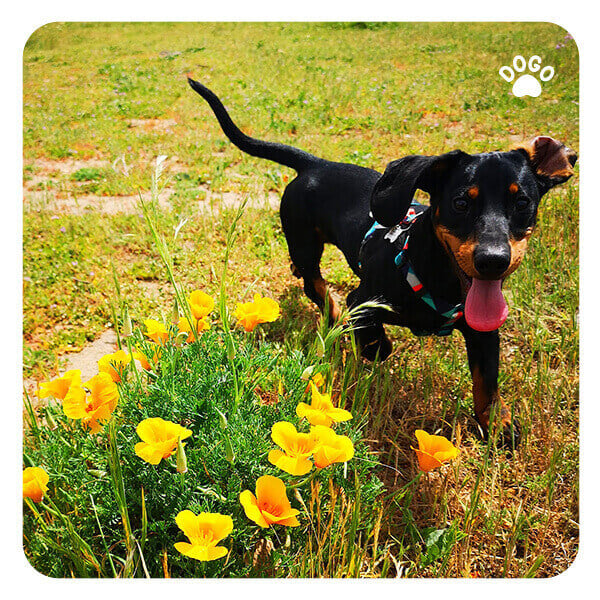4 Puppy Behaviors That Your Dog Should Grow Out Of
Post Date:
November 6, 2023
(Date Last Modified: November 13, 2025)
Puppy behavior and development.
Why puppy behaviors matter
Early behaviors influence long-term safety, housetraining success, and how a dog tolerates people and other animals; knowing which behaviors should decline helps set practical goals. The primary socialization period for puppies is roughly 3 to 14 weeks of age[1], and exposures during that window strongly shape later sociability.
“Growing out of” a behavior means a measurable reduction in frequency or intensity such that the behavior no longer presents routine safety, property, or quality-of-life problems for household members; realistic timelines link to developmental milestones rather than arbitrary deadlines. The four behaviors covered here are mouthing/nipping, jumping on people, house-soiling, and destructive chewing — each has identifiable training and management strategies that accelerate the natural fade of puppy-stage expressions.
Nipping and mouthing
Mouthing is a normal part of play and oral exploration for young dogs, but by the end of puppyhood it should be replaced with gentle, inhibited contact rather than hard bites. Many puppies begin the teething phase at about 3 months and continue teething through roughly 6 months of age[2], which explains increased chewing and harder mouthing during that window.
Distinguishing play mouthing from escalated biting depends on intensity and response to correction: a soft mouth that stops when the handler withdraws attention is normal, while repeated hard bites that break skin or trigger fear are a red flag. Simple bite-inhibition exercises include yelping or withdrawing attention on a hard mouth hit and immediately rewarding calm contact when offered; those sequences should be brief, consistent, and paired with an alternate behavior such as a calm chew object or a sit.
Breed and size matter for risk assessment: larger breeds that retain strong adult jaw power require earlier and more consistent inhibition training to prevent dangerous outcomes as the dog matures.
Jumping on people
Jumping is typically attention-seeking or a greeting behavior driven by excitement; dogs that receive inconsistent responses can practice the jump and make it persistent. Training an alternate greeting — for example teaching a reliable sit and keeping four feet on the floor — is effective when practiced deliberately in short repetitions.
Work the replacement behavior in brief, focused training bursts of about 3 to 5 minutes several times per day until the dog reliably chooses the calm option in increasingly distracting situations[3]. Management strategies for visitors include asking guests to ignore a dog that jumps, using a leash or baby gate at entry points, and arranging controlled practice greetings so the puppy repeatedly rehearses the desired calm response.
For high-energy moments, preemptive calm cues and timed exercise or structured play can reduce the arousal that prompts jumping.
House-soiling and inappropriate elimination
Reliable elimination control is essential for a functional household; most housetraining programs combine predictable schedules, supervision, and confinement when supervision is not possible. A commonly used rule of thumb is that a puppy can hold bladder control for about one hour per month of age, up to a practical maximum of about 8 hours for mature adult dogs[4].
Crate training paired with a consistent feeding and outdoor schedule creates repeated opportunities for reinforcement of elimination in the correct location. When accidents persist despite consistent routine, rule out medical causes such as urinary tract infection or gastrointestinal upset before assuming the problem is behavioral.
Troubleshooting setbacks involves tracking times of accidents, noting contexts such as marking near doors or furniture, and adjusting schedules or confinement durations rather than increasing punishment, which can worsen avoidance and confusion.
Destructive chewing and gnawing
Puppies explore with their mouths and use chewing to relieve teething discomfort; by teaching acceptable targets and managing access, owners preserve property and support dental comfort. Offer at least 2 to 3 appropriate chew options and rotate those items on a schedule of roughly every 3 to 7 days to maintain novelty and interest[5].
Supervision, short-term confinement to a safe area, and environmental management reduce opportunities to practice destructive chewing. Safe chew choices should be matched to size and chewing style; soft rubber toys for aggressive chewers and braided fabric or dental-safe chews for lighter chewers are typical recommendations. When chewing targets appear prey-driven rather than teething-related, redirect to an approved item and reward the switch immediately.
How to distinguish developmental norms from persistent problems
Not every immature behavior is pathological. Use age, frequency, and context to decide whether to escalate intervention. For example, mouthing that declines in intensity as adult teeth arrive is developmental; mouthing that intensifies or causes injury over time requires professional assessment. Look for escalation cues such as rising intensity despite consistent correction, onset of fear reactions, or generalization of the behavior to new contexts.
Simple monitoring tests include logging incident frequency over two-week blocks and observing whether the same antecedents repeat; measurable decline across weeks indicates normal maturation, while steady or increasing rates suggest an entrenched problem.
Core training principles to help dogs grow out of behaviors
Consistent, reward-based training accelerates fading of puppy-stage behaviors. Timing of rewards is critical: mark the desired response and deliver reinforcement within a second or two so the dog links action and outcome. Management and antecedent control prevent repeated practice of unwanted behaviors, which otherwise reinforces them through inadvertent reward.
Keep sessions short and frequent; multiple brief practices are more effective than long, infrequent sessions for young attention spans. Gradually proof behaviors in more distracting settings once a behavior is reliable in low-distraction contexts.
Age and developmental timeline
Recognizing socialization windows, fear periods, and adolescence helps set expectations about when behaviors should naturally decline. Many puppies show a fear sensitive period around 8 to 12 weeks and a later adolescent testing period that can begin around 6 months and continue through roughly 18 months for some dogs[1].
Breed and size influence maturation rates; small-breed dogs often reach adult-like behavior earlier than very large breeds, which may take longer to mature emotionally. Use age-based expectations to pace training goals rather than forcing rapid changes that the dog’s nervous system is not yet ready to support.
| Age range | Common behaviors | Training focus | Expected improvement |
|---|---|---|---|
| 3–14 weeks | Socialization, mouthing | Positive exposures and gentle handling | Rapid gains with structured exposure[1] |
| 3–6 months | Teething, increased chewing | Chew management and redirection | Reduction as adult teeth arrive[2] |
| 6–18 months | Adolescent testing, energy surges | Proofing, consistency, graduated challenges | Gradual stabilization over months[1] |
| Adult | Established patterns | Maintenance, targeted behavior modification | Long-term reliability with reinforcement[3] |
Common owner mistakes and quick fixes
- Laughing or petting during rough mouthing unintentionally rewards the behavior; instead withdraw attention and offer an approved chew object immediately.
- Inconsistent cues from family members let a puppy “shop” for the easiest outcome; choose one cue set and enforce it across caregivers.
- Allowing practice of a behavior during unsupervised moments lets it consolidate; simple fixes include temporary confinement, scheduled play, and a short training cue before high-trigger events.
When to seek professional help
Some behaviors require a trainer or veterinary behaviorist for safety and effective remediation. Red flags include persistent escalation to aggressiveness, severe anxiety that impairs normal functioning, or behaviors that create ongoing safety risks for people or other animals. If a dog shows repeated biting with increasing severity or signs of fear-based aggression, consult a clinician who can assess medical and behavioral contributors.
When choosing help, a certified force-free trainer can address most basic training and management problems, while a veterinary behaviorist (a veterinarian with additional behavior certification) is appropriate when medical issues, drug therapy, or complex aggression patterns are present. Bring a concise history, feeding and exercise schedules, and short video clips showing the behavior in context to any appointment to help the professional assess triggers and response patterns quickly.




